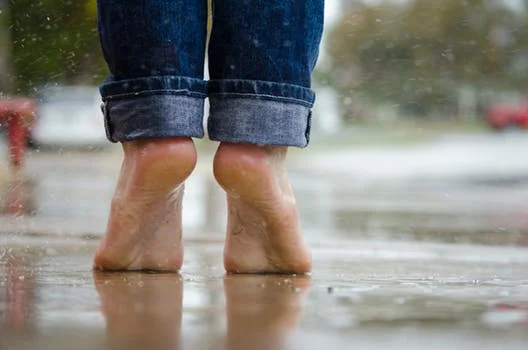The word plantar refers to the bottom of your foot. Fascia is fibrous connective tissue found all over your body, and the suffix “itis” means inflammation of. So “plantar fasciitis” is the fancy medical way of saying inflammation at the bottom of your foot.
It’s the most common cause of heel pain, and many of us get it at some point in our lives. It’s caused by irritation to the fascia in our feet, which can happen in a number of different ways.
Your calves have bands of connective tissue that run all the way to the bottom of your feet. If your calves are tight then that connective tissue is being pulled taut. This creates more friction at the bottom of your feet as the tissue slides back and forth. Then that friction causes pain.
Also, any exercise which involves running or jumping can cause micro tears to form in the plantar fascia, and so can doing work that requires you to be on your feet all day. If you’re standing or walking for several hours a day, especially if you’re walking on a hard floor, or in shoes with worn soles you could definitely be doing damage to your feet.
If you were born with high arches or flat feet then you have to be even more careful to prevent plantar fasciitis. Abnormalities in your foot arch can put extra strain on the plantar fascia, making injury and inflammation much more likely.
The bottom line is you need your feet to get you places! So take care of them by being aware of plantar fasciitis and taking prevention measures. If you have high arches or flat feet, talk to your podiatrist about getting customized shoe inserts that will help distribute your weight on your feet the right way. Always stretch your calves and feet after exercising. Don’t walk on hard surfaces with your bare feet. Make sure that your shoes have good heel cushioning. And if you’re holding onto a few extra pounds, lose that weight to take pressure off your feet.
If you already have plantar fasciitis, then there are a couple of different things you can do to treat it. Stretch your calves daily. Stretch the bottom of your feet by rolling them on a tennis or golf ball. And aim to reduce or even eliminate inflammation causing foods, like sugar, white flour, and trans-fats.
Acupuncture powerfully treats any kind of pain and plantar fasciitis is no exception. By directing blood flow and pain relieving endorphins to your heels, acupuncture treatments can give you relief. The needles don’t even go in your heels! But they direct the flow of healing elements right where they need to go.











